Strategies and Tactics
STRATEGY 3.1: Support digital scholarship.
- TACTIC 3.1.1 -- Transform the GIS Lab into a lab that supports a range of digital scholarship activities.
- TACTIC 3.1.2 -- Form a cohesive Open Scholarship unit under the umbrella of Digital Strategies & Scholarly Communication.
TACTIC 3.1.1
Demonstrates a commitment to promoting education, fostering innovation, enhancing infrastructure, and fostering partnerships for sustainable development. Additionally, it underscores the importance of providing students and faculty with access to modern digital tools and resources to support their research and scholarly activities.
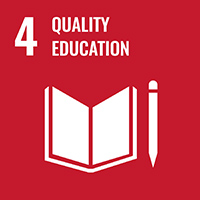 |
Goal 4: Quality Education Transforming the GIS Lab into a multifunctional digital scholarship facility enhances access to educational resources and promotes innovative teaching and learning methods. By providing students and faculty with access to advanced digital tools and resources, the facility contributes to quality education and skill development. |
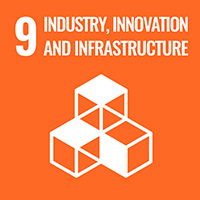 |
Goal 9: Industry, Innovation, and Infrastructure Aligns with the goal of promoting innovation and the development of modern, efficient technological solutions for supporting research, collaboration, and knowledge dissemination. |
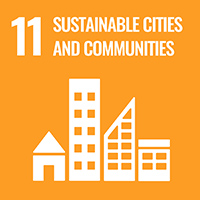 |
Goal 11: Sustainable Cities and Communities Contributes to building sustainable and inclusive communities by fostering research collaboration, knowledge sharing, and community engagement. The facility can serve as a hub for interdisciplinary collaboration and innovation, promoting the intellectual and cultural vitality of the University. |
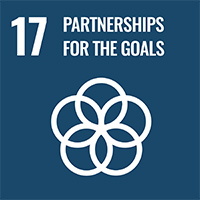 |
Goal 17: Partnerships for the Goals Transforming the GIS Lab into a digital scholarship facility involves partnerships for sustainable development. By collaborating with academic departments, research centers, and external partners, the institution can leverage expertise and resources to create a dynamic and inclusive space for digital scholarship activities. |
TACTIC 3.1.2
Reflects a commitment to promoting education, fostering innovation, enhancing infrastructure, and fostering partnerships for sustainable development. Additionally, it underscores the importance of advancing open scholarship practices to support global knowledge sharing, collaboration, and social impact.
 |
Goal 4: Quality Education Establishing an Open Scholarship unit promotes quality education by advancing open access to scholarly resources, facilitating knowledge sharing, and supporting open educational practices. By advocating for open scholarship principles and providing support for open access publishing and educational resources, the unit contributes to enriching learning experiences for students and educators. |
 |
Goal 9: Industry, Innovation, and Infrastructure Creating a cohesive Open Scholarship unit reflects innovation in scholarly communication and infrastructure. It aligns with the goal of promoting innovation and the development of efficient technological solutions for advancing open access, open data, and open educational resources. |
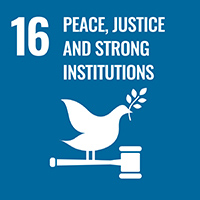 |
Goal 16: Peace, Justice, and Strong Institutions Promoting open scholarship principles contributes to building strong and inclusive institutions by fostering transparency, equity, and collaboration in scholarly communication. Open access to research results and educational resources promotes greater accountability, trust, and collaboration among researchers, educators, and the public, supporting the advancement of knowledge and social progress. |
 |
Goal 17: Partnerships for the Goals Establishing an Open Scholarship unit involves partnerships for sustainable development. By collaborating with academic departments, research centers, libraries, publishers, and other stakeholders, the unit can leverage expertise and resources to advocate for open scholarship practices, build capacity, and promote broader participation in open knowledge initiatives. |
STRATEGY 3.2: Support curation and discovery of University faculty scholarship.
- TACTIC 3.2.1 -- Further develop Research Data Services in the University Libraries.
- TACTIC 3.2.2 -- Partner with relevant University units to ensure that the Libraries provide a comprehensive record of University faculty scholarship.
TACTIC 3.2.1
Demonstrates a commitment to promoting education, fostering innovation, enhancing infrastructure, and fostering partnerships for sustainable development. Additionally, it underscores the importance of supporting data-driven research practices to address global challenges, advance knowledge, and promote social progress.
 |
Goal 4: Quality Education Supports quality education by providing students and researchers with access to resources and support for managing, analyzing, and sharing research data. By offering training, consultations, and data management tools, the initiative facilitates data-driven learning and research experiences, contributing to the quality of education. |
 |
Goal 9: Industry, Innovation, and Infrastructure Developing Research Data Services reflects innovation in scholarly communication and infrastructure. It aligns with the goal of promoting innovation and the development of efficient technological solutions for managing and sharing research data, advancing data-driven research methods, and fostering interdisciplinary collaboration. |
 |
Goal 16: Peace, Justice, and Strong Institutions Contributes to building strong and inclusive institutions by promoting transparency, integrity, and accessibility in research practices. By offering guidance on data management, sharing, and preservation, the initiative supports responsible research conduct, fosters trust among researchers, and enhances the reproducibility and impact of research outcomes. |
 |
Goal 17: Partnerships for the Goals Further developing Research Data Services involves partnerships for sustainable development. By collaborating with researchers, academic departments, funding agencies, and data repositories, the initiative can leverage expertise and resources to support data-intensive research, promote data sharing, and address challenges related to data management and stewardship. |
TACTIC 3.2.2
Demonstrates a commitment to promoting education, fostering partnerships, encouraging innovation, and building sustainable communities. Additionally, it underscores the importance of collaboration across academic units to support the dissemination and impact of faculty research and scholarship.
 |
Goal 4: Quality Education Providing a comprehensive record of UM faculty scholarship supports quality education by enhancing access to scholarly resources for students, researchers, and educators. By collaborating with academic departments, research centers, and other units, the libraries can ensure that faculty publications, research data, and other scholarly outputs are curated, preserved, and accessible for educational purposes. |
 |
Goal 9: Industry, Innovation, and Infrastructure Ensuring a comprehensive record of UM faculty scholarship reflects innovation in scholarly communication and infrastructure. It aligns with the goal of promoting innovation and the development of efficient technological solutions for managing, showcasing, and preserving scholarly outputs, such as publications, datasets, and creative works. |
 |
Goal 11: Sustainable Cities and Communities Providing a comprehensive record of faculty scholarship contributes to building sustainable and inclusive communities by fostering research collaboration, knowledge sharing, and intellectual engagement within the university community and beyond. |
 |
Goal 17: Partnerships for the Goals Involves partnerships for sustainable development. By working together, the libraries can leverage expertise and resources across the institution to develop robust systems and services for capturing, organizing, and disseminating faculty scholarship. These partnerships can also facilitate interdisciplinary collaboration, knowledge exchange, and the sharing of best practices in scholarly communication. |
STRATEGY 3.3: Support openness in scholarly communication.
- TACTIC 3.3.1 -- Develop policies and guidelines for direct repository deposit and for journal publishing.
- TACTIC 3.3.2 -- Proactively facilitate and make the process of publishing open access for all UM authors affordable.
TACTIC 3.3.1
Reflects a commitment to promoting education, fostering innovation, enhancing infrastructure, and fostering partnerships for sustainable development. Additionally, it underscores the importance of promoting open-access publishing and transparent research practices to address global challenges, advance knowledge, and promote social progress.
 |
Goal 4: Quality Education Developing policies and guidelines for repository deposit and journal publishing supports quality education by promoting open access to scholarly resources. By establishing clear procedures for depositing research outputs in institutional repositories and publishing in open-access journals, the initiative enhances the accessibility and visibility of educational materials for students, educators, and researchers worldwide. |
 |
Goal 9: Industry, Innovation, and Infrastructure Aligns with the goal of promoting innovation and the development of efficient technological solutions for disseminating research outputs, advancing open access, and fostering collaboration within the scholarly community. |
 |
Goal 16: Peace, Justice, and Strong Institutions Contributes to building strong and accountable institutions. By promoting open access, transparency, and ethical publishing practices, the initiative supports the integrity of scholarly communication, fosters trust among researchers and stakeholders, and advances the dissemination and impact of research for the benefit of society. |
 |
Goal 17: Partnerships for the Goals Developing policies and guidelines for repository deposit and journal publishing involves partnerships for sustainable development. By collaborating with academic departments, research centers, funding agencies, publishers, and other stakeholders, institutions can leverage expertise and resources to promote open-access publishing, address copyright and licensing issues, and support compliance with funding mandates and institutional priorities. |
TACTIC 3.3.2
Contributes to advancing knowledge dissemination, supporting global research collaboration, and driving positive change in the scholarly publishing ecosystem.
 |
Goal 4: Quality Education Promotes equitable access to educational resources and scholarly information. Open access publishing enables researchers, educators, and students to access the latest research findings and educational materials without financial barriers, enhancing education quality and advancing knowledge dissemination. |
 |
Goal 9: Industry, Innovation, and Infrastructure Fosters a culture of innovation and drives positive change in the academic publishing landscape, leading to more efficient, transparent, and accessible scholarly communication systems. |
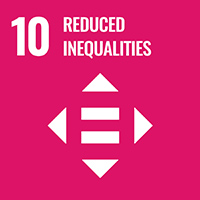 |
Goal 10: Reduced Inequalities By eliminating or reducing publication fees and other financial barriers, this initiative promotes greater inclusivity and diversity in scholarly communication and contributes to leveling the playing field for researchers worldwide. |
 |
Goal 17: Partnerships for the Goals Contributes to global efforts to promote open science, enhance research impact, and address the challenges of scholarly communication in the digital age. |
STRATEGY 3.4: Facilitate collaboration and interdisciplinary research partnerships.
- TACTIC 3.4.1 -- Implement "The Conversation Project", an initiative to engage faculty in conversation about their current and future research and teaching.
- TACTIC 3.4.2 -- Develop a Faculty and Research Commons on the second floor of Richter Library that can facilitate interdisciplinary faculty collaboration, serve as event space, and connect to related third floor services (active learning spaces, conference room, digital scholarship and research librarians).
TACTIC 3.4.1
Demonstrates a commitment to promoting education, fostering partnerships, encouraging innovation, and building strong institutions. Additionally, it underscores the importance of creating supportive environments for faculty engagement, professional development, and scholarly communication to advance knowledge, address global challenges, and promote social progress.
 |
Goal 4: Quality Education Engaging faculty in conversations about their research and teaching enhances quality education by fostering a culture of continuous learning and knowledge exchange within the academic community. By providing opportunities for faculty to share their expertise, insights, and experiences, the initiative enriches teaching practices, promotes interdisciplinary collaboration, and enhances the learning experiences of students. |
 |
Goal 9: Industry, Innovation, and Infrastructure Aligns with the goal of promoting innovation and the development of efficient mechanisms for supporting faculty engagement, research dissemination, and teaching enhancement within the academic community. |
 |
Goal 16: Peace, Justice, and Strong Institutions Facilitating conversations among faculty members contributes to building strong and inclusive institutions by promoting transparency, collaboration, and academic freedom. By providing a platform for open dialogue and exchange of ideas, the initiative fosters mutual respect, trust, and understanding among faculty members, thereby strengthening institutional cohesion and resilience. |
 |
Goal 17: Partnerships for the Goals Implementing "The Conversation Project" involves partnerships for sustainable development. By collaborating with academic departments, research centers, and other stakeholders, institutions can leverage expertise and resources to organize meaningful conversations, seminars, and workshops that facilitate knowledge sharing, networking, and collaboration among faculty members. |
TACTIC 3.4.2
Underscores the importance of creating supportive environments for faculty collaboration, interdisciplinary research, and knowledge dissemination to address global challenges and promote social progress.
 |
Goal 4: Quality Education Creating a Faculty Commons promotes quality education by providing a collaborative space where faculty members can engage in interdisciplinary collaboration, share expertise, and innovate teaching and research practices. By fostering a culture of collaboration and knowledge exchange, the Commons enhances the learning experiences of students and promotes excellence in teaching and research. |
 |
Goal 9: Industry, Innovation, and Infrastructure Developing a Faculty Commons reflects innovation in academic infrastructure and collaboration spaces. It aligns with the goal of promoting innovation and the development of modern, efficient spaces for supporting interdisciplinary collaboration, digital scholarship, and research dissemination within the academic community. |
 |
Goal 11: Sustainable Cities and Communities Contributes to building sustainable and inclusive communities within the university campus. By providing a central hub for faculty collaboration, the Commons fosters community engagement, promotes the exchange of ideas, and best practices and enhances the overall academic and social vitality of the campus environment. |
 |
Goal 17: Partnerships for the Goals By collaborating with academic departments, research centers, and other stakeholders, the library can leverage expertise and resources to design a space that meets the diverse needs of faculty members and promotes interdisciplinary collaboration, networking, and knowledge sharing. |

4 Strategies
8 Tactics
= Learn how these tactics align with the United Nations Sustainable Development Goals